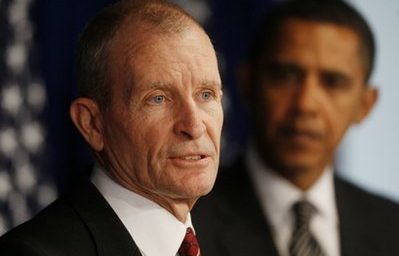Don’t Blame Michael Moore
Matt d’Ancona has a provocative piece in the Daily Telegraph entitled, “The hawks have only themselves to blame for Michael Moore’s success.”
Unlike Moore, I supported the destruction of the Taliban regime and the liberation of Iraq. But I also have to acknowledge the aplomb of his campaign, and the cunning of his strategy. He has not only touched a nerve; he has filled a vacuum. He has identified the feebleness of the campaign to persuade the public that the war on terror is necessary and exploited that weakness to the hilt.
In the process, he has done much to nurture the delusion that the war is simply the folly of a deranged President and his greedy acolytes, rather than a deeply-rooted global crisis and the defining challenge of our time. At precisely the moment that the horizons of Western electorates should be broadening, they are narrowing dangerously. The debate has grown perilously introspective: on both sides of the Atlantic, the war on terror is in danger of becoming just another sub-category of domestic politics.
Moore is the most powerful spokesman of the myth that gripped the Spanish people when they elected Jose Luis Rodriguez Zapatero as their Prime Minister in the wake of the Madrid bombing: namely, that if we oust specific politicians from office – replace Bush with Kerry, Blair with Brown – the Islamic fundamentalists will leave us alone. It is, of course, psychologically reassuring for voters to be told that they have this power, that there is something quick and clean they can do about their collective predicament. But it is also a fantasy. The theocratic guerrillas of al-Qaeda and its associates who, it emerged last week, were planning to bomb a British primary school in Madrid and, on Friday, promised fresh attacks in Europe, will not be appeased by any number of political scalps. Their ambitions for the world are much greater and more terrifying.
But who can blame Michael Moore for seizing his chance? No war in modern history has been as badly sold to the public as this one. In private, the Prime Minister admits to colleagues that, in this respect, “I have failed”. No Western politician, including Mr Blair, has succesfully produced a political narrative which transcends the old methods of spin developed in the 1990s and explains why the war on terror is a completely new kind of struggle.
Indeed, the problem with the American “neocons” – Cheney, Rumsfeld et al – is that they are not “neo” enough. They use old Cold War language to describe an utterly modern conflict. This war may well, for a start, be longer than the great struggle of the second half of the last century. It is certainly more complex: the triple, interlocked threat of weapons of mass destruction, global terrorist groups and rogue states is much more difficult to explain than the monolithic danger which was represented by the Soviet bloc and its ideology. And, to be prosecuted successfully, the war on terror will require durable public faith in politicians and the intelligence services that inform them: the very trust which has taken such a terrible beating before, during and after the Iraqi conflict. The anti-war lobby has the slick movies of Michael Moore. And what do we hawks have? The sickening images of Abu Ghraib, that’s what.
Quite right. Blair did a superb job of selling the Iraq War; Bush, much less so. But none of the West’s leaders have done a good job of connecting the dots in a way to get the public on board.
Partially, this is a result of the prison of political correctness in which we’ve ensnared ourselves. It’s rather difficult to explain why we must defeat an enemy if we simultaneously have to note that they are actually wonderful, peaceful people. Further, the willingness of fat, happy societies to sacrifice in the way they did during World War II is suspect. It’s been so long since we’ve had to do it in any serious way that we’ve come to expect things to be quick and easy. Indeed, even our volunteer soldiers expect to be home in a matter of months. In this way, we’re very much a victim of our success.




Well put.
Are you kidding me?! The problem was that despite the best efforts of the Bush spinmeisters the truth about the lies that were spun about this war couldn’t be hidden any more, though Bush and co. continued to lie and because they don’t have their act together, were saying conflicting things that did find their way into the public record. The people want to hear the truth, and that is what M. Moore is offering. You can’t take it as gospel, just as you couldn’t take what Bush, Cheney, et al said as gospel, but when there is some good documentation to back it up, you can’t help but believe. Don’t make it into an issue it is not – the truth speaks for itself!
So, I suppose you progressives want to withdraw completely from the rest of the world? No trade (that cultural hegemony is a result of trade), no troops anywhere except the US?
Sounds a bit more right-wing isolationist than ‘progressive’ to me.
Paul, your allegiance to Terrorists is what makes you soft on terror.
I don’t think blair’s sales job turned out so good. But anyway, I must say this Paul Lutefisk fellow is quite a nice new addition to the comments section.
“hegemony.” heh.
Christina’s found religion. How nice for her.
—